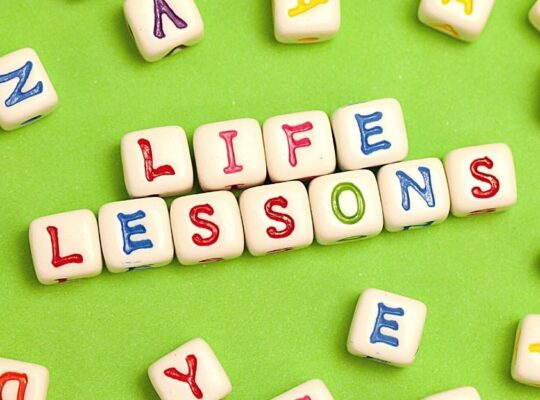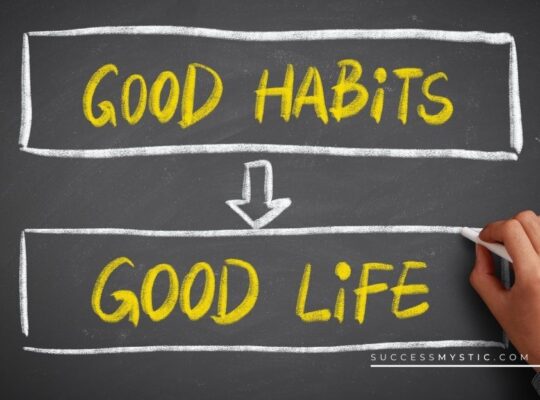In this article: Make conscious choices about how you will be affected by the things that happen in life.
There is something robotic about how we live our lives. Especially these days. Wake up, go to work, return home, make dinner, television on until bedtime. Sure, there are certain variations and deviations, but we live a lot of our lives on autopilot.
We have a set routine, we have habits that take over, and those impulses carry us through life so much so that you don’t have to stop to think about much often. There are positives about that, there are because it allows your brainpower and energy to be used elsewhere. The problem is that we don’t generally use that brainpower and energy elsewhere.
We’re like spit in the rain. This means that your impulses aren’t within your control because they have taken control of you. It’s that lack of self-awareness that results in anxiety, stress, and depression. It’s that that causes a struggle with how you react and respond to the things that happen in life.
If you want to make conscious choices about how you will be affected by the things that happen in life then you need to build your self-awareness. There’s a lot of work you can do on the self-improvement front, but this particular journey begins with self-awareness.
Self-Awareness
Self-awareness is the conscious ability to understand your character, motives, desires, and feelings. You are aware of your thoughts, what you feel and why, how you act and why, and even how you interpret the events and situations in your life.
Increasing self-awareness clears your mind of the negative self-talk that drives you mad. It helps you see your life more clearly, it helps you see yourself more clearly. It is the point at which introspection meets your ability to recognize that you are an individual. You stand alone, separate from others, and separate from your environment.
Think of self-awareness as belonging to the toolbox of self-control. Self-control involves your ability to monitor your thoughts and emotions as they change from moment to moment and self-awareness is encompassed in that. It’s the key to understanding yourself on a deeper level and making peace with who you are while also proactively managing and maintaining your emotions, thoughts, and actions.
Self-awareness boils down to this – the clear concept of your whole self, your personality, strengths, thoughts, emotions, weaknesses, motivations, and beliefs. It facilitates improved decision making.
People with a strong sense of self-awareness act consciously and because of this, they tend to make better decisions which result in positive mental and physical health. They tend to be more positive, compassionate, and ultimately, enjoy life on a deeper level.
Think of it as the tool that unlocks change in belief. Challenging your core beliefs and changing them for the better is going to be the foundation for any change you make to your life’s emotional quality.
Typically, the emotional reactions you experience are the result of certain assumptions you have made about how life should be. They’re not based in reality. While your feelings are always valid, they are not always factual.
We make assumptions about everything, the people we know and meet, the relationships we build, the job we do, and those assumptions set you up for the emotional reactions you will experience. Self-awareness is the clarity of assumed beliefs.
It doesn’t matter what your self-improvement goals are, self-awareness is always the first step because it moves you closer to being your authentic self. You might never understand every aspect of the person you are, but life is about exploring, and trying to build your self-awareness is the exploration of self to understand and be a better person. It is a crucial trait for any level of success, whether it is in your career or in the personal relationships you build.
Developing Self-Awareness
It’s always easier to correct behavior when you catch it early. At this point, you’re probably looking at correcting a lifetime of bad habits and poor behaviors. Thus far you have allowed your emotions to run rampant and unrestrained.
However, when you develop self-awareness it becomes easy to correct those behaviors. The big question now is how can you develop a stronger sense of self-awareness?
There are plenty of ways to do so and it all boils down to paying attention to the finer details of your behavior, emotions, actions, and personality.
- The key to self-awareness is being brave enough to not look away. You have to be honest with yourself and you have to have the courage to take an objective look at your strengths and weaknesses.
- Use a journal to your advantage, it’s a good place to keep track of your thoughts, as well as your plans, priorities, and goals. Think of it as your guiding light in the storm.
- One of the biggest challenges you will deal with is negative thoughts. Those negative thoughts are almost as automatic as breathing, but they are rarely rooted in truth. Those people who lack self-awareness tend to accept these negative thoughts as the truth which results in a wildly distorted perception of reality. When you experience these irrational, negative automatic thoughts you have to question them. When you do you will soon realize that they are rarely rooted in reality.
- What’s the story of your life? You might not have realized it, but as you have told this story it formed your personality. It didn’t shape it, it became it. Is it an accurate life story? Take a look at early moments in your life, the people, experiences, and events that had the biggest impact in shaping that story and the person you are. Is any of it real or have you been on the wrong path for so long you got lost?
- When those emotions crop up, it’s important that you understand what they are and where they are coming from. What emotion do you feel most often? How many different ones have you experienced in the last day or so? What triggers these emotional responses?
- Meditation and mindfulness are two excellent tools that will help your self-awareness of your mental habits grow. Mindfulness is essentially purposefully paying attention to everything in the moment and allowing yourself to feel it and experience it without judgment. It’s as though you’re an outside observer watching it all play out and understanding the response of your inner state as it does. You can practice at anytime and anywhere.
- Self-discipline is something you should practice in every area of your life, but it will also help build self-awareness since forming healthy habits to achieve goals is part and parcel of self-discipline. The two work hand-in-hand.
- One of the best tools for building self-awareness is feedback, but it’s also one of the scariest things you can do. The key to making feedback useful is to ask people you trust to be honest and analyzing it objectively.
- While you’re working on important skills, take a look at your willpower. It isn’t always enough to simply know intellectually that something is bad. For example, there is not a smoker on this planet who doesn’t understand that smoking can lead to lung cancer. That doesn’t make it easier to quit. They knew that when they lit the first one. Awareness is an important part of the process, but so is the willpower to change.
- If you’re still struggling to get a read on yourself, then search the web for online personality quizzes and psychometric tests. It might sound silly, but it might give you an idea about some important character traits that you have been overlooking. Are you an idealist or a realist? Everyone has to start somewhere.
Exploration Through Self-Reflection
If you want to build self-awareness to improve yourself and make conscious choices about how you will be affected by the things that happen in life, then daily reflection as a means of exploration is a great way to do it.
This is your daily opportunity to challenge yourself with the following questions…
- What is it that I want to achieve?
- What is it that works?
- What is it that slows me down?
- What things can I do to start making changes?
- What do I want my legacy to look like? What would it look like now?
- What do I want my life to look like 5 (10, 15, 20, etc.) years from now? What would it look like if I changed nothing?
- What is my guiding light?
- What is my long-term goal?
Self-awareness is a lifelong effort, but so is self-improvement and you can’t have one without the other.
Self-Management
Now that we have discussed self-awareness, let’s move onto self-management. The two combined will ensure you are capable of making conscious choices about how you will be affected by the things that happen in life. Without self-management, self-awareness will go to waste. Let me provide you with an example.
Ryan is incredibly self-aware, but she struggles with self-management. She often seeks feedback and every time she does, she learns that she speaks for far too long (and perhaps too often) in business meetings. This is a behavior she has tried to work on because she wants to be productive to and for the team.
So, she started keeping track of exactly how often and how long she spoke in meetings. She realized that in a meeting with 9 people she spoke 35% of the time. The feedback was correct, but she justified this level of involvement by arguing that her points needed to be made. However, she decided to evaluate her participation.
She knew she was speaking too much, but she wanted to hit all of her points. As self-aware as she is, her self-management lets her down consistently.
Self-management requires four steps and this conscious choice you make will help you use self-awareness to your advantage.
- Firstly, you have to be present in every situation. It’s important that you pay attention to what’s going on in the moment, not what happened 30 minutes ago or what’s going to happen in the next 30 minutes.
- You have to develop self-awareness. This is well-tread so we don’t need to cover it again.
- You have to identify a wide range of choices behaviorally. What next, what consequences may come, what feedback can inform your decision? What other choices can you make that won’t result in those same consequences, even if it’s not in line with your normal response?
- Choose behaviors that are productive, the ones that will ensure the most positive outcome.
Circling back to Ryan, what would her self-management look like based on the above advice?
- She can start by being focused on what everyone else is saying and paying more attention to what’s going on in meetings rather than getting caught up in presenting her points. Is her input valuable at the moment or could it be an email?
- Ryan is self-aware enough to know she’s excited to share her ideas and as desperate as she is to share examples, she can remind herself that other people need a chance to speak. Everyone should have the opportunity to participate.
- Rather than dominating the conversation, she can identify a better behavioral choice. For example, Ryan could explain an idea and then invite others to share theirs. Or she could simply sit and listen patiently.
- If she’s choosing productive behavior then she can sit back and listen to what everyone else is sharing. Ryan’s feedback repeatedly highlights that she talks too much and steals opportunities from others trying to contribute. The more productive choice would be to allow others the chance to speak.
Generally, the productive behavior is misaligned with both your preferences and your habits. If it weren’t… well, you wouldn’t need self-management, would you? It might feel uncomfortable at first. It would do, you are acting unnaturally based on your preferences. It’s contradictory to how you normally act and often, your habits can kick in and take over. It makes sense, your habits are essentially shortcuts your brain has created and enforced for years. You have to fight against that, but it’s worth it.
Learning Self-Management
Now, let’s learn how to develop self-management and put it to good use with your new skill of self-awareness.
- Self-Manage What?
How do you typically operate? What do you say, what do you do, what do you not say, what do you not do? You have to decide what areas of your life are in need of self-management and identify the areas where your approach is no longer working.
- What’s Behind The Wheel?
When you notice your self-management is lacking you need to take a look at those moments to see how you feel, how you’d like to feel, what you want, as well as how you interpret everything that’s going on in your environment. What’s behind the wheel driving your actions or inaction? Do you experience a lack of self-awareness in that very moment? Is it an ego thing where you want to look good?
Is it down to insecurity or a lack of skill? What is it? Ryan spoke too much in meetings, what would have been behind that? It could have been insecurity or a desire to look good. You have to ask what’s driving you in these moments, otherwise, you can’t plan or practice properly. You have to know why you make the choices that you do before you can move on.
- Choose Your Adventure
Forget your habitual behaviors for a moment. If you could easily override the default and self-manage, what else would you do when faced with difficult moments? Think about your choices and your reactions to them before you dive in.
If you start paying attention to choices you will realize how your habits and preferences take over and hijack the process. Now ask yourself this – what is it that you’re trying to avoid by sticking to the rivers and the streams that you’re used to? Are you trying to protect yourself? Is fear motivating you to hide from change? You’d best figure it out quickly because you need to know before you can move forward.
- Plan, Practice, Repeat
You know you want to change. You have a better idea of what has been driving you. You have some options on the table. Now it’s time to figure out what concrete steps you will take.
Remember, your habits are hardwired and if you want to disrupt them you need to use new habits to create neural pathways to override those earlier habits. How? Practice! You have to practice it at every opportunity until it becomes a habit. Be sure to pay attention to what you’re learning from your practice and how you can get better.
You can observe your effort and reflect on your choices in order to revise your plan and practice more. You will learn more every time you do, and you will improve because of it.
When the time comes to work on the next habit or behavior simply repeat the process.
If this scares you, know that that’s a normal reaction because it’s natural to behave in a way that makes you feel familiar. Familiar feels good. It feels good to ignore self-management, but you would never grow if you left it at that. If you want to become a better version of yourself, you need to use self-awareness and self-management to your advantage.
Self-Improvement And Goals
It all comes down to this. Are you going to improve yourself, making conscious choices about how you will be affected by the things that happen in life, and live your best life? Or are you going to float aimlessly? Right now, you have self-awareness and self-management under your belt. Both of those things will help you be more conscious about how life influences you.
To take it a step further, let’s talk about how there are daily self-improvement practices that can help you move closer to your goals. It’s all about incremental improvement and taking steps to make yourself a better person every single day.
- Read
It doesn’t really matter what you read, there is value in just about any type of genre. Even fictional romance books can help you expand your mind and improve your vocabulary. That being said, choose a wide variety of genres to help your brain grow. You know that jogging helps build muscle and protects your heart health, well, reading is jogging for the brain. It will boost memory function and help stave off cognitive decline.
A reading habit can also help you manage stress, which is another helpful trick to boost your memory. Depending on the books you read, you can enrich your mental health, spirituality, and it’s just a nice habit to have too.
- Mindset
You will likely see a shift in your mindset as you work on both self-awareness and self-management. However, you can work on a growth mindset separately from those two things as well. A growth mindset reminds you that you can improve yourself constantly. It pushes you to learn, to educate yourself, and to develop yourself and your abilities.
- Priorities
Your priorities are everything. It’s what you place the most importance on, it’s what you find most meaningful. If you want to improve, then you have to make it a priority which means it has to organically fall into that category.
If there’s an area you desperately want to improve in and you can’t see how it falls in line with your priorities, search for a link if you want to make it stick.
- Visualize
Make time for daily visualization. Visualize yourself completely self-aware, visualize yourself engaging in perfect self-management, visualize the success you want to see. Visualize yourself as a person who makes conscious choices about how you will be affected by the things that happen in life.
- Measure Progress
You can’t just let it go and hope for the best. In addition to building a plan, you have to revisit it to measure your progress. The only way to achieve a goal is to pay attention to the road you’re walking to get there. The best way to stack on track is to keep your eyes on the prize, but that doesn’t mean rest stops aren’t important. Think about measuring your progress as a rest stop where you consult your map.
Use Your Time Wisely
You deserve downtime, but your spare time shouldn’t solely be made up of downtime. Unless, of course, you schedule your day down to the minute including making headway toward your goal(s). Meet the demands of the day, make time for growth, and use every second of this life wisely.
- Look After Your Body
You might question whether this is relevant to self-improvement, but it is. It’s important that you look after your body and by exercising regularly, eating well, sleeping properly, and hydrating you are aiming to be your best self on a daily basis. Your body works hard for you and it deserves respect in return. Looking after it is the most basic level of respect you can pay it.
- Self-Care
A lot of people view self-care as an indulgent waste of time. The reality is that it’s necessary for your overall health and wellbeing. If you work too hard you will fall prey to chronic stress and exhaustion which isn’t healthy for your physical or mental health. It’s important to work hard when the time comes, but it’s just as important to take time to look after yourself.
Self-care means different things to different people and it’s up to you to determine what that looks like for you. For some people, it’s turning everything into a list. For others, it’s a hot bubble bath with a cold beer. Any practice that is an active attempt to protect your happiness and well-being is an act of self-care. Let that guide your self-care choices.
- Take a Break
You might think that self-care already covered this, but downtime is not the same as self-care. Your body and mind need regular breaks, you need appropriate downtime. You need time to recover if you want to be at your best. Breaks help balance your working hours. Downtime gives you a chance to recover properly. The best way to ensure you strike that balance? Make a plan and stick to it.
- Gratitude
Make gratitude a habit. Take time out each day to key in a few things that are going really well. Use those moments of gratitude to boost your spirits and fill you with appreciation. You may want to keep a journal to ensure you stick with it.
- Affirmations
A positive affirmation is simply a statement to support and uplift you. They can help you build self-love, self-esteem, goal chasing, self-management, and self-awareness. They’re a great way to program your mind for the better and develop a growth mindset.
- Forgive
You can make conscious choices about how you will be affected by the things that happen in life and one way to do that is by practicing forgiveness. You can’t change what others do or how they treat you, you can only change how you respond to those people.
You can hold onto a grudge and let it drag you under the waves of bitterness. Or you can choose to forgive and move on. Forgiveness isn’t about letting people off with bad behavior, it’s about letting go of the pain that holds you back.







